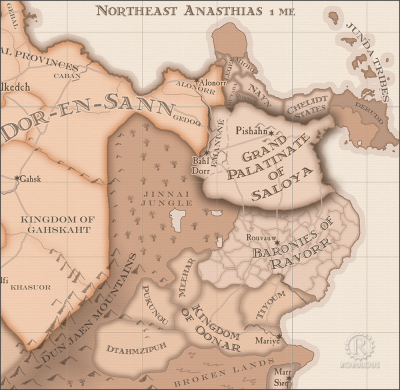Chelidd States
The Chelidd States, also called Chelidt, was a historic nation on the northeastern coast of modern Harthera, known for their strong martial tradition.
Ancient Northeast Anasthias

This is in a series of articles about the ancient history of Northeast Anásthiasplugin-autotooltip__small plugin-autotooltip_bigAnásthias
Anásthias [a-NAS-thee-ass / ænæsθiːæs], or [an-ass-THEE-as] is an equatorial island continent, heart of the Civilised World. The north straddles the equator and is hot and humid, while most of the equatorial centre is an upland plateau with fertile river valleys, and stretches of arid plains and desert in the shadow of the mountains. The south is temperate but more wild, separated from the civilisations of the north by the almost impassable Harthera, before the founding of the modern nation of Hartheraplugin-autotooltip__small plugin-autotooltip_bigHarthera
This is in a series of articles about Harthera
* Name: Hartheran Union, Union of Harthera, Uhartrah * Government: Military-Mercantile Oligarchy * Capital: Vahltor * Foundation: 1 ME (Traditional) * Religion: Church of Hartrah * Language: Hartraan (official), also Saloyan, Rouvawetig, Junda.
History
The Chelidd are an Iskean people who historically lived on the northeastern coast of modern Anásthiasplugin-autotooltip__small plugin-autotooltip_bigAnásthias
Anásthias [a-NAS-thee-ass / ænæsθiːæs], or [an-ass-THEE-as] is an equatorial island continent, heart of the Civilised World. The north straddles the equator and is hot and humid, while most of the equatorial centre is an upland plateau with fertile river valleys, and stretches of arid plains and desert in the shadow of the mountains. The south is temperate but more wild, separated from the civilisations of the north by the almost impassable Harthera. With Saloya to the south and a constant threat from coastal raiders like the Junda, Chelidt communities developed a strong military ethic. All men were trained from a young age in fighting and military discipline. Strict codes of justice and morality developed, by which all citizens were expected to live. These became the binding force of communities.
All Chelidd settlements were self-governing, though they were obliged to commit men and supplies for their mutual defence, and to give aid to rebuild settlements when they were damaged or destroyed.
The Chelidd were not an expansive people, but their martial tradition became important to defend their hostile borders. Junda were a constant menace, raiding by sea particularly in the autumn and winter months, attacking coastal communities. The Chelidd had ships for trade and fishing but no navy to speak of, so Junda ships could travel far along the coast to carry out sneak attacks, often seizing small fishing villages as a base for further raids inland. The States acted by heavily defending the eastern coastal borders with a series of impressively brutalist military fortifications, using Mayapon construction techniques refined for the arts of war. Despite this, throughout its history, the eastern borders of Chelidt shifted back and forth.
While individual communes were self governed by leaders or groups, the Chelidd's only overall leadership was military. Lawmaking varied on a local level, but was influenced by a strong culture of tradition. A small number of states traditionally supplied generals and military leaders, who formed the Marshals of the State. The States system survived for many centuries, even outlasting the troubles of the Saloyan Civil War and the conquest of surrounding lands. In fact, Chelidt was never truly conquered: it joined into a voluntary union with the newly-conquered Junda empire, and contributed greatly to the new nation of Hartrah. The Terath family, dictators and overlords ruling from Vahltor for many centuries, were originally Chelidd.
The Chelidd languageplugin-autotooltip__small plugin-autotooltip_bigLanguages
List of human languages and dialects, contemporary and extinct.
Language
language
This is in a series of articles about Languages and Communication.
topics sidebar cult1 merged with Saloyan to form the basis of modern Hartraan.
